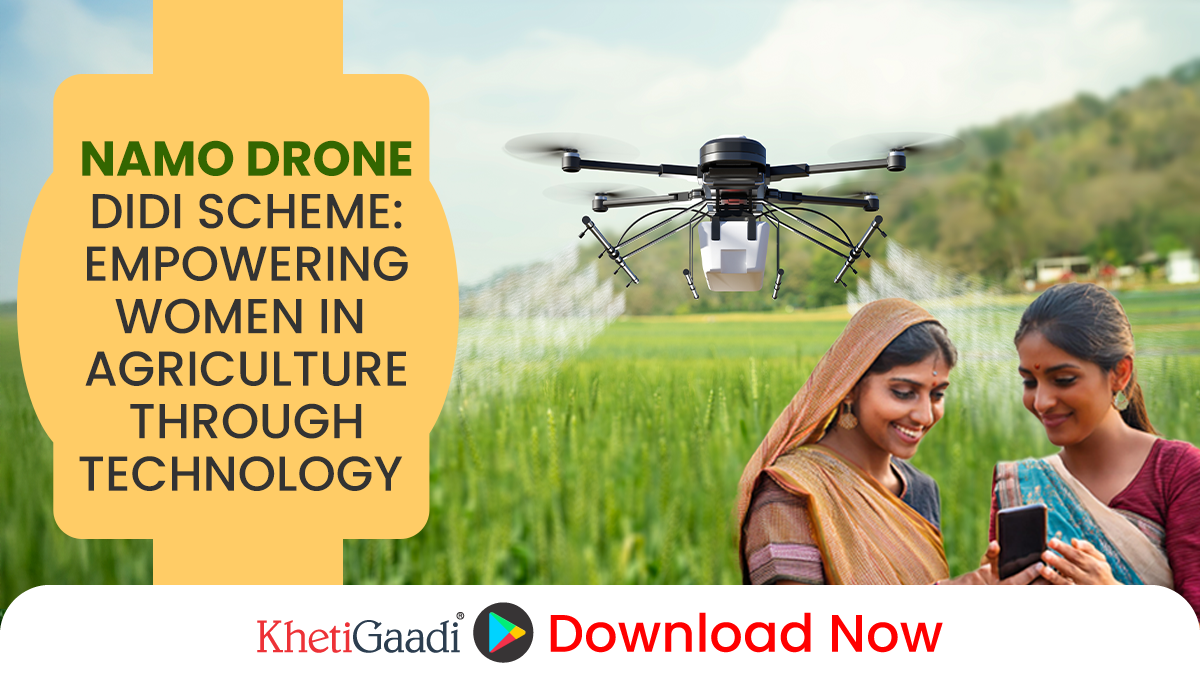The NAMO Drone Didi Scheme, an ambitious initiative by the Government of India, aims to empower rural women by equipping them with the latest drone technology for precision farming. By focusing on women-led Self-Help Groups (SHGs), the scheme enhances their economic independence and plays a pivotal role in modernizing India’s agricultural practices.
What is the NAMO Drone Didi Scheme?
Launched under the Deendayal Antyodaya Yojana – National Rural Livelihood Mission (DAY-NRLM), the NAMO Drone Didi Scheme introduces drone technology to rural women-led SHGs. The initiative seeks to provide drones to 15,000 SHGs over two years (2024–2026), empowering these groups to offer essential services to farmers, such as precision application of fertilizers and pesticides. The goal is to help women SHGs earn additional income, with an estimated annual earning of ₹1 lakh per group, while supporting sustainable and efficient agricultural practices.
Key Features of the NAMO Drone Didi Scheme
The NAMO Drone Didi Scheme is designed with comprehensive support structures to ensure the successful implementation of drone technology in agriculture. Here are the key features of the scheme:
- Financial Assistance
- Subsidy: Women SHGs receive an 80% subsidy on the cost of drones, up to ₹8 lakhs.
- Loan Facility: The remaining 20% can be financed through a loan from the Agriculture Infrastructure Fund (AIF) at a 3% interest rate.
- Drone Training for Women SHGs
- Pilot Training: One member of the SHG undergoes a 15-day training program, which includes 5 days of drone pilot training and 10 days of agricultural application training.
- Maintenance Training: Another member (or a family member) is trained in drone maintenance to handle repair and upkeep.
- Cluster-Based Implementation
- SHGs are identified based on demand-driven clusters in regions with a genuine need for drone services, ensuring the economic viability of the initiative.
- Support from Lead Fertilizer Companies (LFCs)
- LFCs help SHGs procure, maintain, and repair drones, while also promoting the use of nano fertilizers for efficient drone applications in agriculture.
- Comprehensive Drone Package
- SHGs receive a fully-equipped drone package, which includes the drone, spray assembly, carrying box, batteries, and essential accessories like a pH meter and anemometer, all covered by a one-year warranty and two years of maintenance support.
Benefits of the NAMO Drone Didi Scheme
The NAMO Drone Didi Scheme brings a host of advantages that not only enhance agricultural efficiency but also empower women in rural India. Some of the primary benefits include:
- Economic Empowerment of Women
- By providing women with training in drone technology, the scheme offers a new income stream. Each SHG is expected to earn at least ₹1 lakh annually, fostering financial independence and boosting the local economy.
- Enhanced Agricultural Efficiency
- Drones provide precision in the application of fertilizers and pesticides, ensuring uniform distribution and reducing chemical overuse. This leads to lower costs, minimal environmental impact, and higher yields, especially for large-scale farmers.
- Skill Development and Knowledge Expansion
- The training provided equips women with valuable skills in drone operations, crop monitoring, soil analysis, and irrigation management. This knowledge helps women become competitive players in the agricultural sector.
- Community Networking and Collaboration
- Through forums, workshops, and mentorship, women SHGs benefit from a collaborative network of peers and experts. This fosters a sense of community and enables the exchange of ideas and best practices.
Operational Guidelines and Monitoring
The NAMO Drone Didi Scheme is supported by a well-established governance and monitoring framework to ensure effective implementation:
- Empowered Committee: Comprising representatives from key government departments, this committee oversees the scheme’s progress.
- Implementation and Monitoring Committee: Led by the Additional Secretary of the Department of Rural Development, this committee ensures adherence to the scheme’s objectives.
- Drone Portal: An IT-based Management Information System (MIS) tracks drone operations, fund disbursements, and provides real-time monitoring of the scheme’s progress.
Long-Term Impact of the NAMO Drone Didi Scheme
The NAMO Drone Didi Scheme has far-reaching implications for both agriculture and rural women. The scheme aligns with the government’s vision of women-led development and modernizing the agricultural sector through precision farming. Key long-term impacts include:
- Increased Income and Financial Security: By integrating women into the growing drone services market, the scheme ensures a steady income source and financial stability for rural families.
- Sustainable Agricultural Practices: The adoption of drones for precision farming promotes eco-friendly agricultural practices that are both economically viable and environmentally sustainable.
- Improved Social Status of Women: By becoming leaders in agricultural innovation, women gain recognition as entrepreneurs and contributors to the agricultural economy.
NAMO Drone Didi Scheme: A Game-Changer for Rural Women
The NAMO Drone Didi Scheme is more than just an initiative for technological adoption in agriculture; it is a transformative model that offers economic empowerment, technological advancement, and sustainable development. By enabling rural women to operate drones for precision farming, the scheme provides a platform for rural innovation, creating entrepreneurs and fostering a culture of inclusive growth.
Through this initiative, the Government of India is not only modernizing agriculture but also ensuring that women play a central role in shaping the future of India’s agricultural economy. The NAMO Drone Didi Scheme is a clear step toward achieving women’s empowerment and sustainable agriculture, securing a brighter future for rural India.
Drones Available Under the NAMO Drone Didi Scheme
The NAMO Drone Didi Scheme is part of the Government of India’s efforts to empower rural women through modern agricultural technology. As part of the initiative, Self-Help Groups (SHGs) led by women will receive drones designed for precise agricultural applications, such as the distribution of pesticides, fertilizers, and other crop management needs.
Drones Available under the Scheme
The drones provided under the NAMO Drone Didi Scheme come with various features that make them suitable for precision agriculture. These drones are equipped with advanced GPS and sensor technologies that ensure accurate application of agricultural inputs, which leads to reduced chemical use, minimized wastage, and lower operational costs for farmers.
These drones typically include:
- Spray Drones: These drones are designed to carry and distribute liquid fertilizers, pesticides, and other crop nutrients.
- Mapping and Surveying Drones: Some drones come equipped with imaging technology to create precise field maps, helping farmers monitor crop health, soil conditions, and growth rates.
- Multi-Utility Drones: Some drones serve both spraying and surveying purposes, offering versatile options for farmers in different types of agricultural settings.
Power, Brand, and Price Details for Drones under the Scheme
Here is a table that outlines some of the drones available under the NAMO Drone Didi Scheme, along with their key specifications:
| Brand | Drone Model | Battery Power | Spray Capacity | Price (Subsidized) |
| DJI Agras | DJI Agras T30 | 12,000 mAh | 30 Liters | ₹8,00,000 |
| FPL Aero | FPL Aero Crop Dron | 10,000 mAh | 16 Liters | ₹7,50,000 |
| Micro Drone | Micro Drone 2.0 | 8,000 mAh | 10 Liters | ₹6,00,000 |
| Skyfield Tech | Skyfield SF-D300 | 9,000 mAh | 18 Liters | ₹7,20,000 |
| XAG | XAG P40 | 15,000 mAh | 40 Liters | ₹9,00,000 |
These drones are available under a subsidized model that allows women-led SHGs to procure them at affordable prices, making high-tech equipment accessible for rural areas.
Success Stories from the NAMO Drone Didi Scheme
The NAMO Drone Didi Scheme has already seen success in various parts of India, helping rural women not only embrace modern agricultural techniques but also transform their lives economically. Here are three success stories from the scheme:
1. Empowering Women Farmers in Uttar Pradesh
In a village in Uttar Pradesh, a Self-Help Group (SHG) of women took part in the NAMO Drone Didi Scheme. After receiving drone technology training, the group started offering precision spraying services to local farmers. Within just six months, they saw a 25% increase in their income, earning over ₹1.5 lakh annually. The women, who had previously worked as farm laborers, now lead the drone services initiative in their community, becoming key contributors to local agricultural productivity.
2. Boosting Agricultural Efficiency in Maharashtra
In Maharashtra, a group of women SHGs embraced the NAMO Drone Didi Scheme to help farmers in their area apply fertilizers and pesticides more effectively. With the drone technology, the SHG provided precise spraying services, reducing the use of chemicals by 40% and significantly lowering costs for farmers. Their work not only increased crop yield by 30%, but the women also gained recognition as technology-driven entrepreneurs in their region.
3. A Success Story from Tamil Nadu
A women-led SHG in Tamil Nadu took part in the scheme and introduced drone services for crop monitoring and pesticide spraying. By utilizing drone technology, they were able to improve crop yield consistency and reduce pesticide-related losses. As a result, the women earned an additional ₹1.2 lakh per year. They also became trainers for other SHGs in the region, sharing their knowledge about drones, and helping other women gain technical expertise in agricultural innovation.
References:
- KhetiGaadi: KhetiGaadi – A platform providing information about farm equipment, including agricultural drones.
- KhetiGuru: KhetiGuru – A resource for farmers offering guidance on innovative farming practices and technologies.
- Ministry of Rural Development, Government of India: Day-NRLM Scheme – Official site providing information about the Deendayal Antyodaya Yojana – National Rural Livelihood Mission and its initiatives, including the Drone Didi scheme.
- Department of Agriculture & Farmers Welfare: Agricultural Schemes – Information on various government schemes related to agriculture and rural empowerment.
- ICAR – Indian Council of Agricultural Research: ICAR on Precision Agriculture – Resources and studies on the role of technology in agriculture, including drones.
- National Bank for Agriculture and Rural Development (NABARD): NABARD – The central body supporting rural development and offering financial support for various agricultural technologies.
- Department of Fertilizers, Government of India: Fertilizer Use & Policy – Information on policies regarding fertilizers and the promotion of sustainable agriculture.
- Drone Federation of India: Drone Technology in Agriculture – Promotes the use of drones in various sectors, including agriculture, and provides information on how drones benefit farming communities.
- FAO – Food and Agriculture Organization: FAO on Precision Agriculture – Global insights on how technology like drones is shaping the future of agriculture.
- Farming Technology & Innovation Forum: FarmingTechForum – A hub for updates on technology innovations in farming, including drone applications.
Tags




